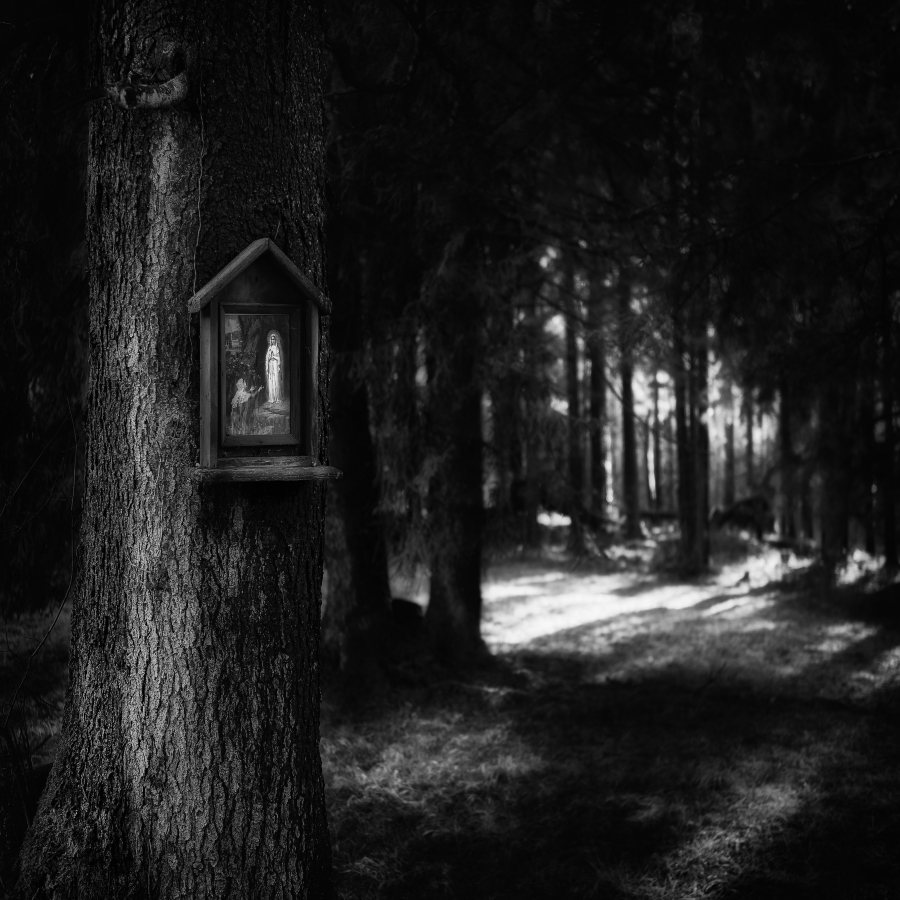After dinner, Father folds a swan out of his paper napkin. Mother says, “My, how early it grows dark.” First Daughter laughs at a flickering outside the window. She thinks it is an out-of-season firefly or a spark from the chimney, but really it is someone creeping through the trees with a flashlight.
Father folds triangle over triangle, smaller and smaller, until a head and wings appear. Second Daughter watches the ghost of her grandmother walk around the table and touch everyone’s plate. Second Daughter wonders if the dead get hungry and eats the last corner of her tuna sandwich in one bite so grandmother’s ghost will not stand too long by her. Birds fly up from the apple orchard in a cloud blacker than the sky. Only Son screams for his bottle. Mother says, “He has such strong lungs; perhaps he will be a soldier.”
First Daughter goes to the fireplace and pretends to do homework. She writes numbers in long columns and eats the eraser of her pencil in secretive nibbles. Second Daughter follows grandmother’s ghost into the kitchen and catches her trying to chew through the rims of cans. Second Daughter wonders if the dead feel pain. She whispers, “Stop,” and grandmother’s ghost throws a can of pureed tomatoes at her. Father places the swan in the bowl of grapes where it rocks over the uneven fruit and watches everyone out of its mustard-spot eye.
Mother clears the plates from the table. She says, “Goodness, these dishes are so clean, I don’t believe they need washing.” Father tears Mother’s napkin into small pieces. In the garden, rows and rows of green beans tangle closer for warmth. The eggs in the henhouse mutter in their sleep. The light outside the window draws closer. Second Daughter sees it and knows what it is. Someone is moving through the forest toward them.
Only Son screams because grandmother’s ghost is biting his upper arm. Mother says, “Perhaps he will be a stockbroker.” First Daughter throws her wool mitten into the fireplace to see the yellow smoke. She loves things for the colors they burn. Mother says, “What is that smell?” Grandmother’s ghost flies shrieking up the chimney. Second Daughter wonders if the dead can get stuck in small places, and Only Son screams because he is growing older. Father touches the swan’s wing with the brown tip of his finger and imagines holding a grape in his cheek, not biting it, just feeling its roundness.
First Daughter wishes she could burn everything. First Daughter wishes she could set her whole body on fire.
Mother says, “When the wind howls like that, it means snow.” Father pinches the swan’s beak so it opens and closes as if repeating Mother’s words. Mother and Father both think of the garden and the tender asparagus, which sells for two dollars a bunch. Later, they will have to cover everything in burlap, as if pulling the covers up over their children. Mother remembers her own mother sitting by her bed on fever nights. Mother remembers planning her trousseau, remembers begging for the white silk nightgown, now yellow as an egg yolk in the upstairs closet. Second Daughter points to the window where the flashlight shines. Everyone looks at the window. Mother says, “My, the moon is bright tonight.” Only Son screams. He can’t remember what moon is, but he thinks it means winter.
Second Daughter imagines all of the things that could be circling her house with a flashlight. She remembers stories from school of children being cut up and left in the forest. She remembers the wolves and the bears and the abused boys who grow up to torture people found via classified ads. Mother says, “Nonsense, that light is too white to be the moon.” Father’s brown fingers crush the swan’s long throat. The grapes wither a little in their porcelain bowl, roll closer to each other for comfort.
Second Daughter opens the door, and a wind rushes in that is not grandmother’s ghost. The light moves away from the window and is lost in the shrubbery. Only Son screams because he knows someday he will sit alone in this same room, hungry and cold. Mother says, “Perhaps he will be a dictator.” Father feeds him a grape. First Daughter holds one finger over the fire and then her whole hand. The swan closes its one yellow eye and tries to remember life before dinner. Father sings a lullaby about three thieves and a serial killer. Mother says, “I believe I am getting a chill.” Mother says, “No one buys the cow when they can get the milk for free.” Only Son moans, and Mother gives him a knife to teethe on. Mother says, “You’ll thank me for this later.”
Second Daughter walks outside where everything smells like a ghost. She leaves without her red cloak, without her father’s ax, without breadcrumbs for the path home. She has only her proud virginity that clangs like a bell, her will to escape like an egg slipping free, and her curiosity, that strange puss, the part of her brain that claws toward the dark. In the night, in the black fringe of the forest, she could be anyone. She could be the witch sipping boy-blood, the doctor scraping lichen for his collection, the girl who runs and runs and runs.
First published in The Collagist January 2010
Published in The Physics of Imaginary Objects, University of Pittsburgh Press, 2010.

